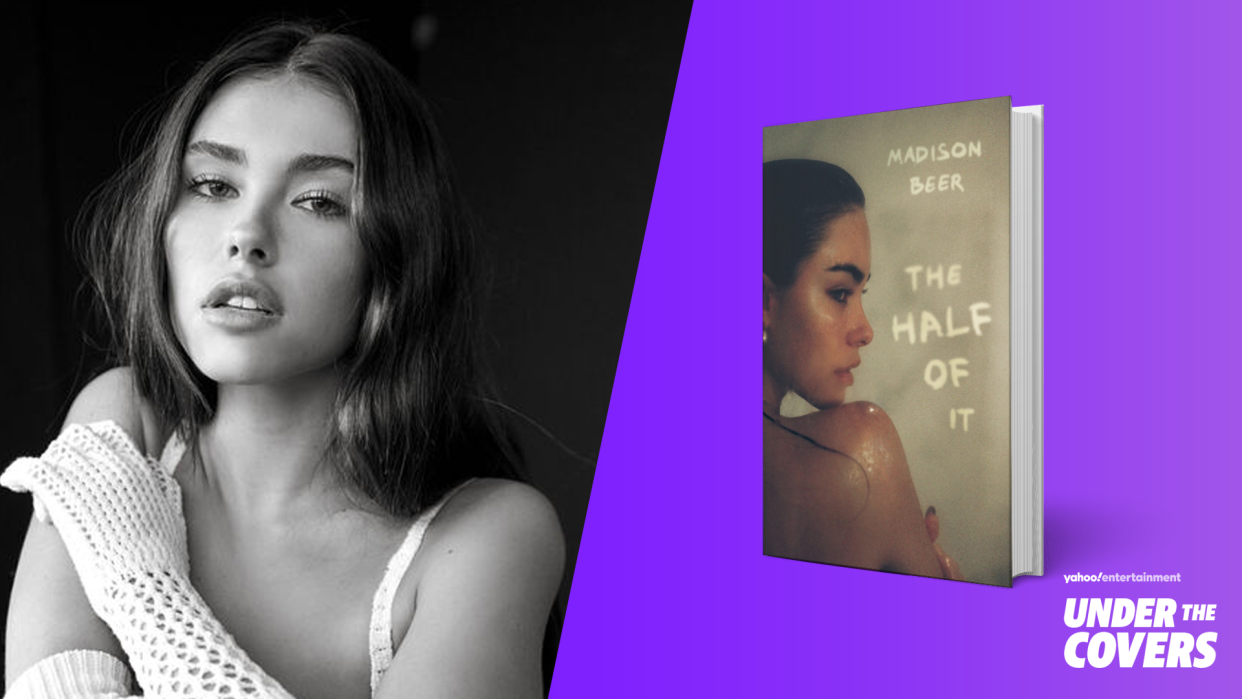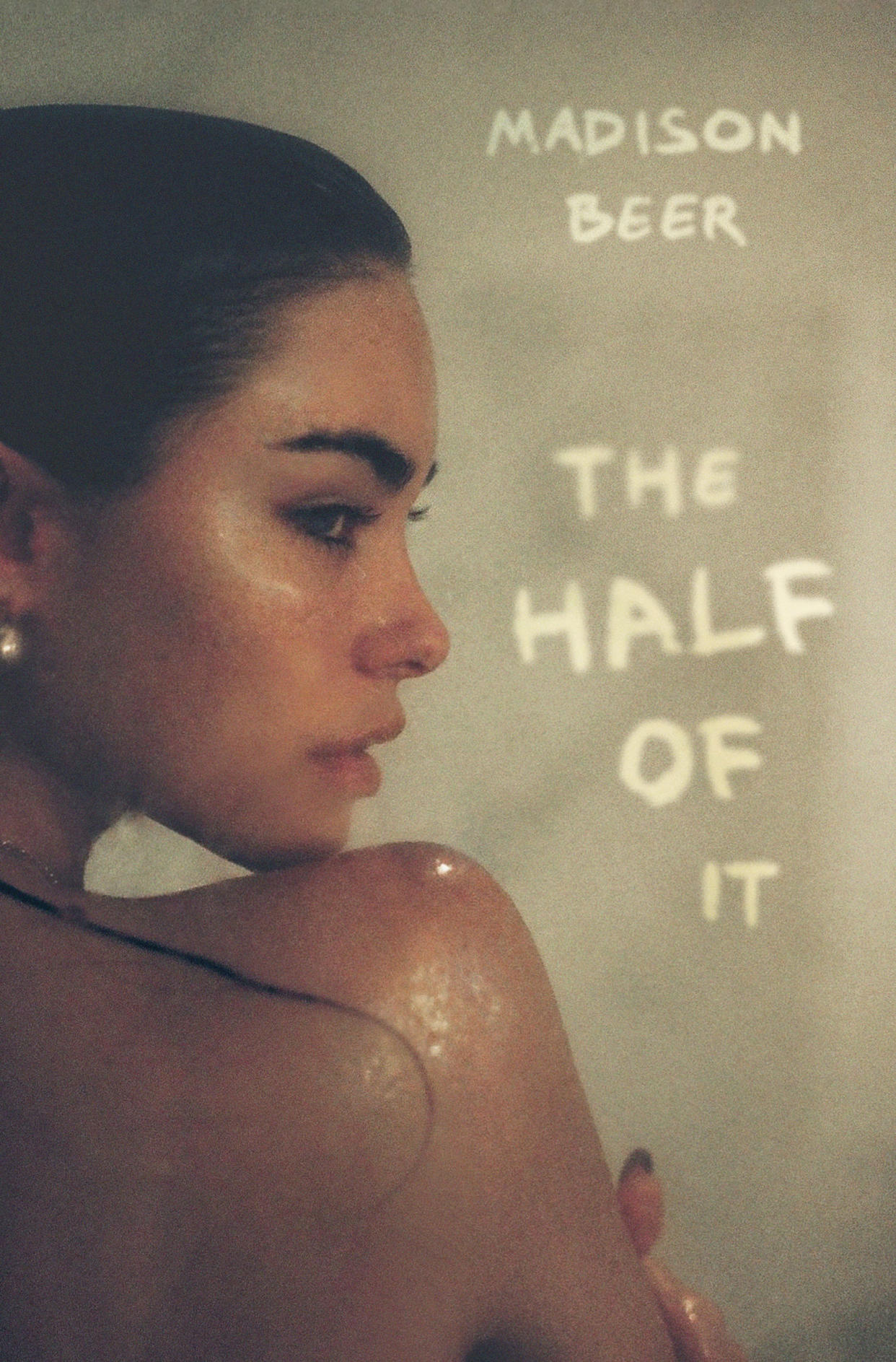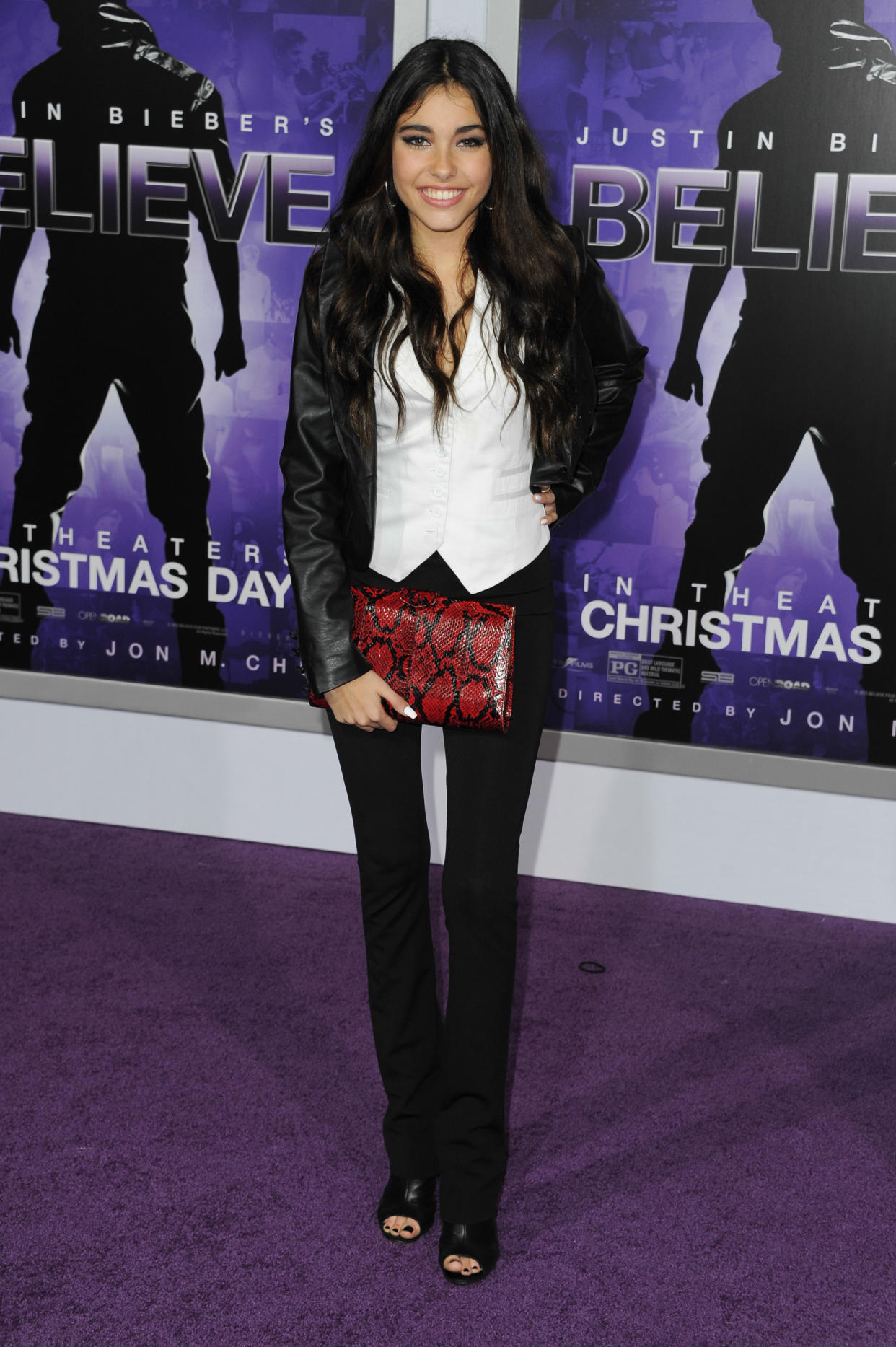Madison Beer says revisiting nude photo leak in memoir is part of 'reclaiming my story'

Madison Beer's new memoir, The Half of It, is a cautionary tale about young stardom, social media and the affect they have on one's mental health.
"Writing it was a very emotional experience," the 24-year-old singer-songwriter tells Yahoo Entertainment of her book, out now.
Beer became famous overnight in 2012 at age 13 after her cover of Etta James's "At Last" was seen by music manager Scooter Braun and shared on social media by Justin Bieber. She was immediately signed to a music label and her social media following soared, but along with feeling like she had little control over her image — being marketed as a Disney Channel-type bubblegum pop star — came relentless online hate, including death threats. It got worse. At 15, a private video she sent her hometown crush via Snapchat a year earlier was leaked. The violation, by someone she trusted, wastraumatizing and she felt unsupported by those around her. It wasn't until six years later that she realized she was actually the victim.
"I definitely feel like I'm reclaiming my story, and that's the mindset I had going into it, but it is still intimidating and scary" releasing the book to the world, says Beer, who writes about suicidal ideations, sexual assault, substance abuse and being diagnosed with borderline personality disorder (BPD). "It's not easy to open up and talk about these things. Having your trauma on such a public scale — to have people talk about it and ask questions and stuff — can definitely be uncomfortable and weird. That's why I'm just trying to be patient with myself throughout this whole process."
While not easy, she feels like she's pointed in the right direction.
"I've opened up about my mental health and my struggles a lot over the years and it's given me a greater purpose in life — [one] that I never really knew was one of my purposes," she says. "I've been able to connect with people in such a real, beautiful, special way."
So the book, which includes journal exercises for readers, feels like a natural progression. "I just felt like this was the right place to do it. I want to be able to talk to people on a bigger scale. It just all kind of felt right to me," she explains.

Beer's book pulls back the curtain on fame, detailing a lonely existence from the start of her career. As so many young people desire to be social media influencers and YouTube/TikTok stars, the Long Island, N.Y., native writes that stardom meant she had no control over her budding career. Nobody listened to her ideas in meetings, she was dressed in clothes she hated, she sang songs she didn't write or like and she was ripped apart by strangers on social media.
In the book, she writes, "Before I was signed, I imagined it like this — I would move to L.A. and be caught up in a whirlwind of music and performances. I'd meet a group of girls in similar positions, and we'd become best friends. People in the industry would be welcoming and excited to work with me because I was young and talented and they'd want to guide me in the right direction. For a while, that's what it felt like. But the truth revealed itself to me with time. Instead, I went to parties and watched people who hated each other pose and giggle for a video together and then go back to sitting on their phones in silence. I tagged along to friends' video shoots and saw how they only smiled when the cameras came into the room to film behind-the-scenes footage. I sat in meetings and had every one of my ideas shot down because I was too young or too inexperienced, which was a fair point and a valid reason — but it isn't what I thought I was signing up for. In a lot of ways, I felt like I'd been lied to."
Yet it wasn't lost on her, even at that young age, that she was given an incredible opportunity — famously dubbed "Bieber's protégé," with perks including being serenaded by him onstage at London's O2 Arena for her 14th birthday — and feared seeming ungrateful, especially because her mother sacrificed her own career to help Beer launch hers. Also, her younger brother's life was uprooted. Beer was left feeling alone and isolated. She spent hours in her new L.A. bedroom, imagining what her friends at home were doing and thinking about the milestones she was missing. She was going online to read other people's opinions about her — comparing it to being on a Truman Show-esque reality show, even while completely alone.

Asked if she thinks hers is a common experience for young females in Hollywood, she tells us, "Yeah, I do. I've been able to speak to enough people, specifically young women who get started at an early age, and I think that the feeling is pretty unanimous unfortunately."
Would it have played out differently had she been signed now at 24, versus then at 13? "I can't really say," she replies. "I mean — I'm not even sure that I would have still been pursuing this career at this age if things didn't start so early for me... But I think we're in a bit gentler of a space right now in general. So I would hope things would be different."
When Beer's nude video leaked in 2014, she felt even more alone navigating the nightmare. She was advised by her team to deny it was her, facing shaming on social media anyway while the people sharing the video, exploiting a minor, faced no repercussions. In the weeks that followed, she was blackmailed by someone claiming to have additional videos. Beer had to use her savings to pay an "internet sheriff" to attempt to scrub the explicit videos from the web. However, she took it upon herself to search the internet for the video, to flag to the sheriff, which led her down some dark, disturbing holes. The violation also resurfaced past trauma of sexual assaults — first as a child and later, between the ages of 14 and 15, at a Hollywood party.
In the book, she writes, "In the aftermath, the hardest part for me to digest was the fact that no one showed up for an underage girl who'd had her privacy violated so ruthlessly. I scoured the internet trying to find one person sticking up for me, just for some sort of comfort — some sort of confirmation that I wasn't entirely in the wrong. I found nothing. Not one person felt bad that I'd had my trust betrayed. Not one person reached out and reassured me that it wasn't my fault. No one stood up and said, 'Hey, maybe this reaction was wrong, and she is only human.' It was only wave after wave of shame."
Beer ended up being dropped by her manager (Braun) and label (Island Records) and it was one of several times she thought about ending her life. Her brother found her, on her balcony, and called for their parents. In the years that followed, Beer worked to rebuild her career as an independent artist. However, she had PTSD, anxiety and depression. She started to self-harm and self-medicate, developing an addiction to Xanax. After a suicide attempt in 2019, she made a promise to herself to get better, committing to therapy. Her recovery has been a journey, not something that happened overnight.
2020 became a pivotal year for Beer. On her 21st birthday, her manager called to say the Snapchat videos had resurfaced. Instantly, all the negative feelings rushed back. But she ended up looking at a photo of herself at age 15, seeing a young child looking back, and it clicked that she had been the victim. Days later, on International Women's Day, she took to social media and for the first time acknowledged that she was in the video and said she'd no longer be ashamed. Soon after, she publicly revealed her BPD diagnosis. While she thought talking about her mental health publicly would be hard — after so much online abuse through the years — it turns out it was aching to come out.
"I've always really valued connections with people and relationships ... so I couldn't wait to make someone out there who maybe likes me or likes my music feel like, 'Oh my god — this person that I love has the same sort of thing as me," Beer says of speaking out about her BPD diagnosis for the first time. "I've always wanted people to feel less alone because, like I talk about in the book a lot, I've felt alone at so many points in my career and life. I wanted people who read the book to feel a bit less alone."
That was part of her going public with BPD in the first place. She recalled, after her diagnosis, Googling people who had it and seeing the names of a handful of famous men but no females. It was then that she decided to tell her story for other young women going through the same thing. She takes her advocacy seriously, sharing that she's hoping to return to school to get a psychology degree to support her path, saying, "It would be really special."
As far as celebrities who have helped her feel a little less alone by sharing their mental health journeys publicly, Beer says, "I think about Lady Gaga a lot. I think she's always been really candid about things that she's gone through and I think she's very strong. I really look up to her a lot."
She also applauds the trend of women sharing their Hollywood experiences in general, citing the Pamela Anderson documentary as being "really incredible" and one to which she "can relate in a lot of ways." But she applauds "anyone who shares their story. I think it's great that we are candid with one another. I think people have a really false idea of what it's like to be a 'celebrity,' whatever that even means."
As for whether she'd one day let her own child pursue stardom, after what she's been through, she says yes with a caveat: "I just wouldn't allow it as young." But she doesn't blame her parents for letting her, even though they've questioned their decision in the wake of her mental health struggles. She also says her family has read her book, revealing, "I think obviously being alongside me in such hard times, they were really proud of it. It was obviously difficult to read ... but I think the ending of it is, whatever 'happy' means, it's happy."
For the record, Beer also has stayed in touch with Bieber. "I speak to him pretty regularly, she says, noting the last time was "probably like a month ago."
These days, Beer has a different relationship with social media that she did starting out and every hateful comment pierced her heart, but she couldn't look away.
"I do read comments," she admits. "But I have learned to limit myself and stop myself if and when it's too much or negative or whatever. It's been like a lot of knowing who I am and being able to be like: 'Hey, I don't need to respond to every single person who feels some type of way about me.' I do keep a distance between social media and myself. I try to really not sit on it all day and just read and read because it'll consume you."
Besides, she's busy making music. A great outcome of this is that Beer has been able to make the music she loves in this phase of her career. Her latest album, Life Support, came out in 2021 on her new label, Epic Records, and songs touched on her mental health journey.
She hoping for a summer release for her sophomore album, she says. "I'm excited to continue to get music out. I'm really, really proud of it. It is the music that I've always wanted to make, so I'm really pumped."
On this album, like her first, "Everything written and co-produced by me," she says. "It's been a really awesome, fun experience. I'm really lucky that I get to work with people that I do. We have this common understanding and speak the same language. Making music is definitely what I live for" — now that she can do it on her own terms.
If you or someone you know is experiencing suicidal thoughts, call 911, or call the National Suicide Prevention Lifeline at 988 or 1-800-273-8255 or text HOME to the Crisis Text Line at 741741.
If you or someone you know has been sexually assaulted, help is available. RAINN’s National Sexual Assault Hotline is here for survivors 24/7 with free, anonymous help. 800.656.HOPE (4673) and online.rainn.org.
The Half of It is out now.
